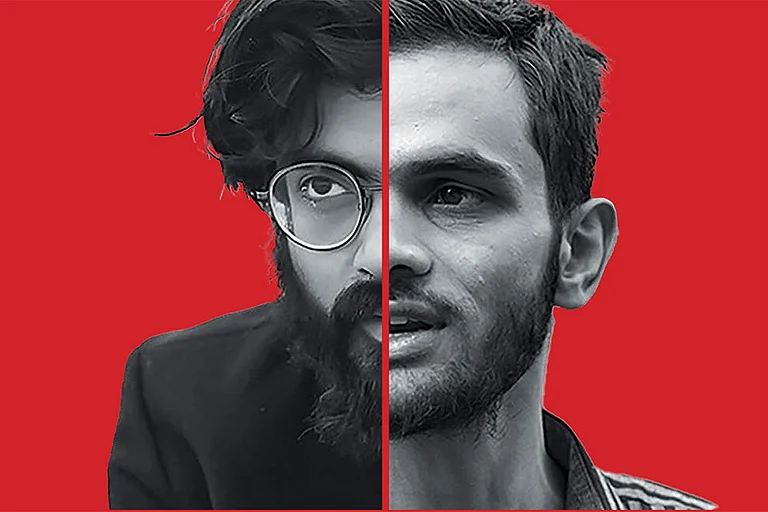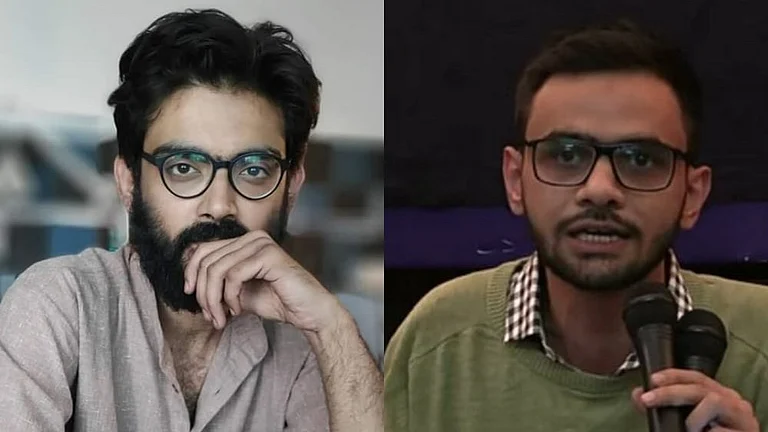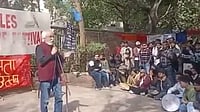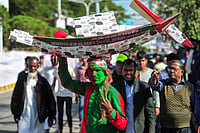
Sharjeel Imam has spent over 2000 days in jail under UAPA without trial; his lawyer, Ahmad Ibrahim, detailed systemic delays and court inaction across similar cases.
Speakers, including Harsh Mander and Hartosh Singh Bal, argued that Imam is being punished for his Muslim identity and political dissent, not for any proven offence.
Afreen Fatima criticised the JNU community for abandoning Imam despite his leadership during anti-CAA protests, calling him one of the clearest Muslim voices today.
“Dissent, particularly dissent by people of Muslim identity and people from the left and the broad left, has become extremely dangerous,” said Harsh Mander, adding that, “The government has made it very clear that it will not tolerate dissent.”
Mander was speaking to Outlook on August 4, 2025, during a public meeting titled “2015 Days of Injustice” that was held at Sabarmati Dhaba, Jawaharlal University (JNU), demanding the release of jailed scholar Sharjeel Imam and the repeal of charges against all political prisoners. Organised under the banner “JNU United for Sharjeel Imam”, the meeting brought together academics, activists, lawyers, and journalists who spoke against the incarceration of Sharjeel Imam.
The date marked 2015 days since Imam’s arrest in January 2020. He remains in prison under the Unlawful Activities Prevention Act (UAPA) for speeches made during the anti-CAA movement. The event’s poster carried a clear demand: “Free Sharjeel Imam. Free All Political Prisoners.”
Speakers included activist Afreen Fatima, former IAS officer Harsh Mander, and Caravan Magazine Editor Hartosh Singh Bal. Also present were Abdul Wahid Shaikh, author of Innocent Prisoners and an exoneree in the 2006 Mumbai train blast case, and Ahmad Ibrahim, Imam’s lawyer.
The poster featured images of several jailed activists and accused persons in cases tied to political dissent and communal violence. The organisers placed Imam’s continued imprisonment in the wider context of the state’s use of anti-terror laws against Muslims and other marginalised groups.
Former IAS officer and human rights activist Harsh Mander, speaking to Outlook, drew attention to what he called an increasingly hostile environment for dissent in India, particularly dissent voiced by Muslims and those aligned with left or progressive politics.
Mander described Imam’s recent announcement to contest the Bihar Elections as an act of moral courage. “I think it’s a courageous step. It requires a lot of bravery that he’s placed this battle above the battle for his own freedom,” he said, referring to Imam’s refusal to disown his politics. “We’ve had other people also who have fought elections from jail. I think there’s a proud tradition of it. And I wish him the best in his battle.”
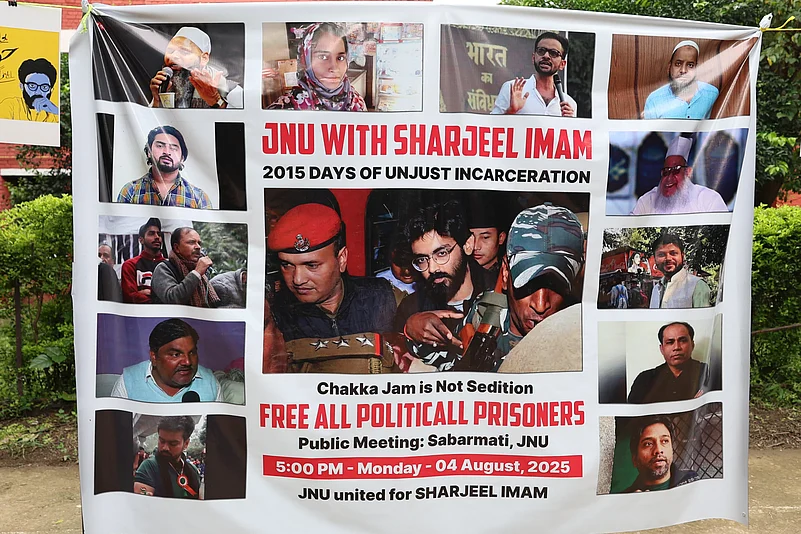
In an interview with Outlook, Ahmad Ibrahim, lawyer for Sharjeel Imam in the Delhi riots conspiracy case, described the deep structural delays, procedural hostility, and political bias shaping the prosecution of UAPA accused across India, especially in NIA courts. “In most of the cases, the trial hasn’t commenced in at least 3, 4, or 5 years,” he said. “This is nothing new.” Citing other UAPA cases where accused persons have spent over seven years in custody with barely two witnesses examined, Ibrahim said this is the pattern, not the exception.
He pointed out that many of the accused persons are from states like Kerala, West Bengal, Kashmir, Bihar, and Uttar Pradesh. “These people have a lot of difficulties. They don’t know anybody here in Delhi, they don’t get proper representation, and their family is also scared to come. So they don’t do anything about the cases,” he said. As a result, they don’t file bail applications or seek a speedy trial. “They think they will never get bail.”
He emphasised that this pattern of delays and resistance is not unique to Imam’s case but a general tendency across UAPA trials. Even when courts start hearing arguments on the charge, the sheer volume of documents delays proceedings indefinitely. “The charge sheets are always bulky. 7,000, 8,000 pages, 10,000 pages, and electronic data which runs into a couple of hard disks,” he said. “We need time to go through these documents. If there is anything missing, unclear or dim, or illegible, then we file an application.”
In Imam’s case, too, a trial court order from two years ago had directed that the trial would be conducted on a day-to-day basis. “Everybody is required to come; no adjournments will be given.” But the direction had no effect. “We cannot direct a judge. The judge has a lot of cases,” he said. Even when bail applications are made citing trial delays, courts refuse to act. “It will be an injustice on the accused also because hundreds of witnesses are to come. You have to take some time to prepare and then cross-examine them.”
He called for stricter systemic measures. “There should be some stringent guidelines that in any UAPA case, every week, there have to be two hearings. And witnesses have to come. They cannot seek an adjournment.” He pointed out that even the Supreme Court has ruled for day-to-day hearings in UAPA trials, but “it’s either logistically impossible or the courts don’t want to do this.”
Of the eight cases against Sharjeel Imam, seven had been bailed out by 2022. The one pending case is the UAPA conspiracy case. “In April 2022, the bail application was filed in the High Court,” Ibrahim said. “It has not been decided yet.”
He pointed to a January 2025 Supreme Court order directing that all bail applications must be disposed of within 14 days by subordinate courts and within one month by High Courts. “In all the cases,” he stressed. “This is distinct from trial. When you go through the trial, it’s a long-drawn-out process. But when you file for bail, you are saying, ‘Boss, I will attend the trial… I will not flee, I will not tamper with the evidence, give me bail’.”
‘Sharjeel is still in jail because of his name’
Hartosh Singh Bal, Executive Editor of The Caravan, speaking at the event, began by acknowledging what he called the obvious, that nothing being said at the meeting was new. “Nothing I or anybody here is going to say today is going to be new or is going to be something that you do not know,” he said. But the facts still needed to be repeated.
He argued that the ongoing incarceration of Sharjeel Imam, despite the absence of evidence, could not be understood outside the question of identity. “The reason Sharjeel today continues to be in jail after five years, when there is not an iota of evidence... is because his name is Sharjeel. If he carried my name or if he carried a Hindu name, he would not be in this position today.” Looking around at the names on the posters, he noted, they were overwhelmingly Muslim, with a few Marxists. These, he said, were the two categories that had been systematically persecuted by the government since 2014.
Bal insisted that this targeting was not incidental but in line with the ideological project of the RSS. “The RSS is doing exactly what it promised it would do when it comes to power. The derision, the persecution, and the isolation of Muslims are the very basis of the RSS’s existence in power. This is what sustains and keeps this government in power.”
There is no meaningful distinction, he said, between Sharjeel Imam and Umar Khalid as far as the state is concerned. While liberal spaces may be more comfortable speaking about Umar Khaled, “for this administration, for this government, there is no difference between Umar Khaled and Sharjeel simply because one is called Umar and the other is called Sharjeel.” The question is not about beliefs or ideology, he said, “It is simply a question of if you come to a certain kind of political prominence and you carry a Muslim name, you suffer.”
He characterised the current moment as one of “functional apartheid” that has been implemented legally and democratically. “We are a country living through an internal partition in which one segment has become the grounds on which the RSS conducts its politics of persecution and power. This is our reality today.”
Bal said the hope that justice would be delivered through the courts, legislature or administrative systems was just that, a hope, not a reality. “Unless and until at some point the challenge is political,” he said, the system will not change.
Bal said Muslims were by far the biggest sufferers of this regime. He cautioned against bracketing all marginalised groups together in the same way. “Let us not make that mistake,” he said, arguing that the systemic shift since 2014 had disproportionately and deliberately targeted Muslims. “Sharjeel is perhaps one of the most visible embodiments of what is happening in this country.”
He closed by underlining that the only meaningful solution was political resistance on the ground. “Our answers no longer lie [in academia or courts]. If Sharjeel said people should come out on the streets to seek justice, this is not something new,” he said, pointing out that the RSS itself came to power opposing the Emergency, with Jayaprakash Narayan once saying far more radical things. “Unfortunately, the Congress is unwilling to wage its politics on the ground. They prefer Twitter, they prefer speeches, they prefer social media, they prefer seminars. The battle that needs to be fought is eventually a political battle. It is not being fought.”
‘This university failed Sharjeel Imam’
Afreen Fatima, student leader and activist, speaking at the Sabarmati meeting, reminded the gathering that when the Babri Masjid verdict came out, there had been complete silence on campus. “No one was even ready to say that we do not agree with this verdict,” she said. It was Sharjeel Imam, she pointed out, who rallied the students and led the only protest from the Sabarmati lawns. “Even today we have not been able to wake up,” she said. Despite the sacrifices made by people like Sharjeel Imam, Umar Khalid, and Gulfisha Fatima, she said, “we are not willing to own them… to stand next to them shoulder to shoulder.”
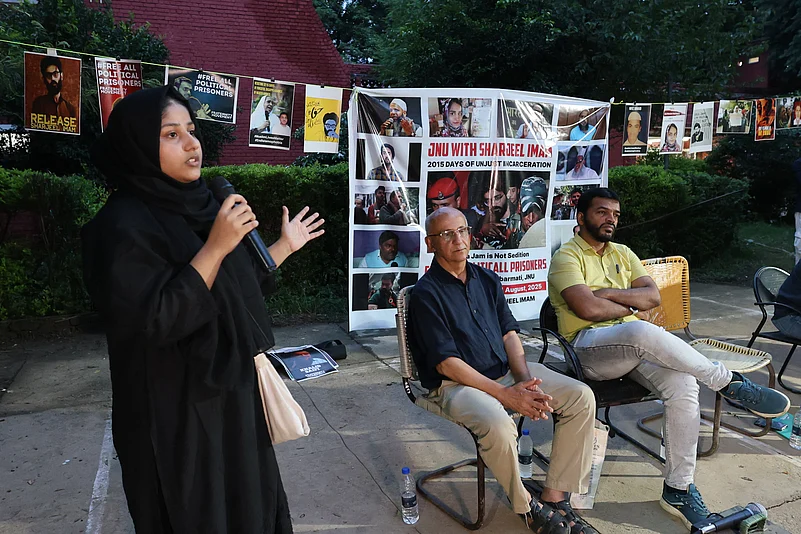
Fatima noted that Imam and others had led resistance against what she described as “one of the most hostile regimes this country has seen,” and had done so by asserting a Muslim identity unapologetically. “Creating a movement as big as Shaheen Bagh is such a big thing in itself,” she said. And yet, she said, the debate still lingers over “what he said was right or not.” She argued that not a single word from Imam’s speech justified a UAPA charge. “Not even a single word,” she emphasised.
In a university that calls itself a champion of social justice and debate, she said, “This university failed its own.” According to her, Imam’s speech was “one of the most constitutional speeches that are out there,” and the student community had failed to defend it. “As a society, we have failed because we are not even able to defend a speech,” she said.
Fatima said it was “sad, disappointing and disturbing” that even after more than five years of his incarceration, people still had to defend what he stood for. She said the mainstream had been weaponised through “WhatsApp University propaganda” and a complicit media. Yet, when Imam was criminalised, she said, “Most of us, especially from this university, the JNUSU, the JNUTA, were the first people to throw him under the bus.”
Recalling events from December 2019, Fatima said that it was Sharjeel Imam who, on December 5, that year, when the CAA was still just a bill, called for a Chakka Jam from within JNU’s own campus. “Chakka Jam is one of the most peaceful, one of the most constitutional democratic ways of protesting,” she said. And yet, she noted again, “this university failed Sharjeel Imam.”
“Sharjeel Imam represents a community of young Muslim voices,” she said. “He talks to the real on-ground aspirations of the Muslim community.” Even in the larger conspiracy case, Fatima noted, he has been isolated, treated as fringe, and disowned by others seeking bail. “This just shows the moral collapse, the moral depravity that people can have.”










